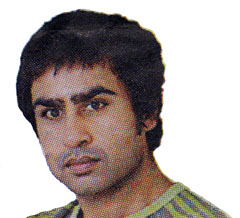|
Intermix.org.uk is a website for the benefit
of mixed-race families, individuals and anyone who feels they have a multiracial
identity and want to join us. Our mission is to offer a view of the mixed-race experience, highlighting icons, film, books, poetry, parenting techniques, celebrities, real lives and much more. Our online forums are a great place to meet others, ask questions, voice your opinions and keep in touch. Sign up for our monthly newsletter and delve into our pages. Want to join in? Become an Intermix member to take part: |
Mixed-Race Taboo That Gave Me Life
Nirpal Dhaliwal
 I've
been free to date and marry as I pleased. I only wish my parents had
been given the same choice.
I've
been free to date and marry as I pleased. I only wish my parents had
been given the same choice.
Listening to a Radio 4 documentary on
Monday got me thinking about the way racism has not only affected my
life, but also played its part in bringing me into the world. Called
The Last Taboo, the show dealt with the prejudice Asians often face from
their own families when they fall in love with a black person. Colour
prejudice is strong in India, especially in the north, where skin tone
is associated with caste.
I'm very much the product of the subcontinent's attitudes to race and sex.
In 1973, aged 21, my dad was a soldier serving with the British Army in
Belize. He was seeing a local girl who was black, who then became pregnant.
He wanted to marry her and take responsibility, and came back to London
to tell his family. They were outraged.
My grandfather was among the first pioneering Punjabi immigrants who settled
in the area around Southall in west London. He was fiercely proud of his
position in the community, and was devastated by the thought of being 'shamed'
by my father dishonouring what was then a rigid tradition of arranged marriage.
In response, he set about finding a Sikh wife for his son as quickly as
he could.
My mother had then been in London a few months. She'd come to Britain
to marry a man her brother had found for her. Marrying someone over here
was the only way she could escape the patriarchal restrictions of rural
Punjab. But things hadn't worked out as planned. On meeting her, the
man refused to marry her, saying she was too dark-skinned, even though
she was a very beautiful woman. Her brother then went in search of another
husband, wanting to get her off his hands as fast as possible.
He eventually met my granddad: one wanted to marry off a sister who
was too dark, the other wanted to shackle a son about to marry a pregnant
black woman. My parents had a family-chaperoned meeting that lasted
half an hour, in which they never said a word.
My dad initially refused to get married; adamant he'd keep his promise to the
girl in Belize. My granddad went into a fury, then wallowed in a sulk, trying
to make my dad feel guilty. Crushed by his father's response, and terrified of
being ostracised, my dad submitted. A week later the pair were married, and a
year later I was born.
My dad wrote to his girlfriend, telling her what had happened. She wrote back,
asking, ‘How can your parents be so cruel?’ and told him she would
terminate the pregnancy.
Their honesty about their regrets and disappointments made my parents determined
never to force the same experience on their own children. Like my brother and
sisters, I've been free to date and marry as I pleased. I only wish my parents
had been given the same choice.
This article first appeared in the London
Evening Standard.
:
